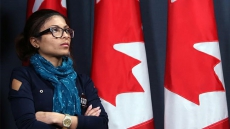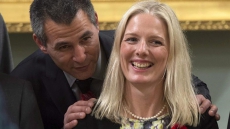OTTAWA — Now that the federal Liberals have shied away from their vow to keep annual deficits under $10 billion, they've latched on to another fiscal target — and this one will be much easier to meet.
The new government is suddenly talking about the debt-to-GDP ratio, promising repeatedly to keep it on a downward track every year until the next election.
The government calculates its debt-to-GDP ratio by dividing total federal debt by the overall size of the economy, as measured by nominal GDP.
It represents a government's capacity to pay back debt — and focusing on it gives politicians more spending flexibility.
By targeting debt-to-GDP, the Liberals could instead be prepared to run annual deficits of up to $25 billion in the coming years and still lower the ratio — as long as the economy grows at a decent pace, economists say.
"The government does have a fair bit of room if what they're trying to do is just see the debt-to-GDP ratio go down," said Mike Moffatt, who teaches economics at the University of Western Ontario's Ivey Business School.
The adoption of the debt-to-GDP ratio as a "fiscal anchor" is not new. It was mentioned in the Liberal election platform as one of the ways to keep spending under control. The campaign rhetoric, however, largely focused on the $10-billion annual deficit.
No longer.
With uncosted election promises piling up on top of unforeseen shortfalls in the underlying fiscal plan, Prime Minister Justin Trudeau has emphasized the more-reachable fiscal anchor in recent days.
"We will continue to decrease (the debt-to-GDP ratio) every single year because that's important for the fiscal health of our country," Trudeau said Wednesday, after casting further doubt on the $10-billion annual deficit target because of economic challenges.
"We always targeted modest deficits, we had hoped it would be around $10 billion — we will see if we will be able to hold at that level."
Plain old math dictates the ratio can continue to fall even if the public books slide into the red — at least to a point.
That's because even if the federal debt gets fatter, the ratio will edge downwards if the economy is growing faster than the debt.

Still, in an economy battered by low commodity prices, the debt-to-GDP promise doesn't exactly look like a slam dunk, either.
Earlier this month, projections by the parliamentary budget office suggested the government could find itself running annual deficits up to $15 billion once the Liberals' costed, big-ticket election promises are factored in. On top of that, the party has also made several uncosted vows.
Then, this week, the Liberals conceded their new tax package will, in fact, drain more than $1 billion net from the treasury each year.
At the same time, economic growth is sluggish.
When considering the forecasts, Scott Clark — a former deputy minister of Finance — believes the Liberals will already be close to the threshold that would start ratcheting up the debt-to-GDP.
"Then you've got a serious problem because then no one's going to believe you," Clark said of the danger of not living up to the goal.
"Your credibility will go straight out the window because if you're going to have an anchor ... you have to live up to it. As soon as you break that, the financial markets will come down on you like a ton of bricks."
The Liberal platform, which helped carry the party to victory in October, also contained a second fiscal anchor: balancing the federal books by the fourth year of its mandate.
But experts believe balancing the 2019-20 budget poses a big hurdle unless the government cuts spending or hikes taxes — or both — to overcome the weaker-than-expected economy and the pricey basket of electoral promises.
Many experts like Clark argue that lowering the debt-to-GDP ratio is a more-appropriate — and achievable — commitment for a government than a balanced-budget anchor.
The government projects the ratio will gradually fall each year from 31.1 per cent in 2015-16 to 25.2 per cent in 2020-21.
But Don Drummond, a former senior Finance Department bureaucrat, questioned the importance of striving to drop an already-low ratio that's much lower than it's been in the past.
"Who knows whether it even needs to be brought down?" said Drummond, who was assistant deputy minister of fiscal policy in the 1990s when the ratio was close to 70 per cent.
"There's nothing in the economic literature that drives you towards the notion of an optimal debt-to-GDP ratio...I think it's a second choice on their part when they can't produce the deficit target that they want. This is kind of a defensive mechanism."
Economist Moffatt, who stress-tested the fiscal numbers in the Liberals' election platform, said if nominal GDP growth returned to a more-normal level in the coming years — of about 3.5 or four per cent — then the government could probably run deficits up to $25 billion without pushing the ratio up.

For 2015, the government only expects nominal GDP to grow by 0.9 per cent largely due to the squeeze of low oil prices, according to its fall fiscal update.
That projection, an average of private-sector forecasts taken in October, also called for a turnaround of 4.1 per cent growth in 2016, 4.6 in 2017 and 4.4 in 2018.




